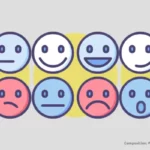
Have you ever had someone you barely knew – a neighbor, co-worker, or even a flight companion – tell you all about their sorrows to the point of leaving you emotionally drained?
If this has happened to you, you should know that there is a substantial difference between emotional relief, which has a cathartic effect, and the tendency to dump trauma on others, a phenomenon known in English as trauma dumping.
Toxic relief, people who overwhelm with their problems
The act of releasing traumas goes beyond a simple confidence. It is a type of “toxic venting” in which someone unexpectedly unloads their psychological trauma on another person, sharing an excess of information and emotions that is inappropriate for the type of relationship that exists.
In many cases, accumulated feelings of anger, resentment or sadness are shared in an uncontrolled manner, to the point of overwhelming the listener since in reality what is being attempted is to transfer the weight of pain and responsibility. Therefore, a relationship is established marked by a significant imbalance and lack of reciprocity.
The person who listens to this toxic vent becomes a kind of “emotional dumping ground”, so they can feel completely overwhelmed, especially if they lack the psychological resources necessary to manage this avalanche of problems, complaints and feelings. It is normal for them to end up exhausted, frustrated and stressed while they wonder: “Do I have to listen to all this? What do I tell them?! “.
Objective: get rid of responsibility
In “Existentialism is a Humanism,” Sartre tells the story of a student who came to him for advice during the Nazi occupation of France.
“His father had quarreled with his mother and tended to collaborate; His older brother had been killed in the German offensive of 1940, and this young man, with somewhat primitive but generous feelings, wanted to avenge him. His mother lived alone with him, very distressed by his father’s semi-betrayal and the death of her eldest son, and her only consolation was him. This young man had, at that moment, the choice of leaving for England and joining the Free French Forces – that is, abandoning her mother – or staying by her mother’s side, and helping her live.“
Sartre argued that the student did not really want advice, but rather to be told what to do. He realized that that young man was carrying “The entire responsibility for the decipherment. The helplessness that implies that we ourselves choose our being.” Therefore, his main objective in asking for his opinion was actually to transfer the responsibility of the decision.
Likewise, many people tell us their problems so that we can decide for them and give them a solution. They are not limited to venting emotionally, they are not looking for a sympathetic ear but for someone to take care of their difficulties. They want to shift the burden, responsibility, and anxiety of the choice onto others. And that, obviously, is not fair.
Not only is it unfair, but it is also unhealthy. First, because the person abdicates their power to make decisions, probably assuming a victim role that condemns them to passivity and powerlessness. Second, because it forces the listener to embody a role that does not correspond to them and makes them feel deeply uncomfortable.
A question of friendship levels?
Friendships are complicated. In fact, the term “friend” is often used indiscriminately to refer to mere work or school colleagues, neighbors or even friends of our friends whom we practically do not know at all.
Aristotle argued that there are three types of friendship: friends for pleasure who make us laugh and whose company we enjoy, useful friends, who have an instrumental motive and exist for a shared purpose, as well as virtuous or true friends, which are those who want the best for you and are by your side through thick and thin.
In most cases of toxic venting, the person vents their problems because they misunderstand the type of connection. They may feel close to us or we inspire trust to them, but we do not perceive that intimacy. Therefore, the emotional avalanche takes us by surprise, forcing us to suddenly assume a role for which we were neither prepared nor willing.
In fact, an important difference between mere emotional release and trauma dumping is the level of consciousness of both parties.
- Venting occurs when we share our frustrations with someone we trust to reduce our stress level. In fact, many times it only has a cathartic action since we are not looking for solutions but rather emotional validation. In this case, we are aware of what we share and that we are letting off steam. And it is not strange to ask the other: “Can I vent with you for five minutes? ” In emotional relief there is no transfer of responsibility.
- Trauma dumping occurs when we share too much personal and intimate information without the other person’s consent or at inappropriate times. We do not take into account how those words will affect those who hear them and we expect them to give us solutions, shifting our responsibility onto their shoulders. Therefore, it is often perceived as an invasion of the other.
How to deal with toxic venting?
First of all, it is important to remember that trauma dumping is not the best way to deal with problems. It doesn’t help the person who is having a hard time and puts the listener in trouble.
Of course, it is natural that when we have a bad day or go through a difficult period, we need to turn to someone. Venting is part of processing negative emotions, but we must pay attention to who, how, and for what purposes we do it. Burdening others, especially if we barely know them, with our problems – and on top of that trying to transfer our responsibility in the search for a solution – is neither mature nor constructive.
On the other hand, if you find yourself in an uncomfortable situation where someone is using you to vent their traumas and responsibilities, it is better to set clear boundaries. If it’s not a good time, let them know. And if you think you can’t help them, too. Don’t feel obligated to shoulder the emotional responsibilities of someone who doesn’t want to take responsibility for their own emotions.
References:
Thomson, (2024) Is there anything wrong with trauma dumping? In: Big Think.
Giraldo, G. & Huertas, O. (2018) Tipos de amistad según Aristóteles: diferencias entre la amistad por placer, por utilidad y la amistad verdadera. Revista Espacios; 39(06): 25.
Sartre, J. P. (2006) El existencialismo es un humanismo. Barcelona: Edhasa.



